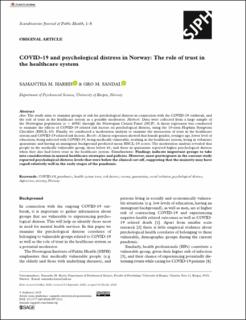COVID-19 and psychological distress in Norway: The role of trust in the healthcare system
Journal article, Peer reviewed
Published version

Åpne
Permanent lenke
https://hdl.handle.net/11250/2739105Utgivelsesdato
2020Metadata
Vis full innførselSamlinger
Originalversjon
Scandinavian Journal of Public Health. 2020, 49 (1), 96-103. https://doi.org/10.1177/1403494820971512Sammendrag
Aim:
The study aims to examine groups at risk for psychological distress in connection with the COVID-19 outbreak, and the role of trust in the healthcare system as a possible moderator.
Methods:
Data were collected from a large sample of the Norwegian population (n = 4008) through the Norwegian Citizen Panel (NCP). A linear regression was conducted to examine the effects of COVID-19 related risk factors on psychological distress, using the 10-item Hopkins Symptom Checklist (HSCL-10). Finally, we conducted a moderation analysis to examine the interaction of trust in the healthcare system and COVID-19 related risk factors.
Results:
A linear regression showed that female gender, younger age, lower level of education, being infected with COVID-19, being medically vulnerable, working in the healthcare system, being in voluntary quarantine and having an immigrant background predicted mean HSCL-10 scores. The moderation analysis revealed that people in the medically vulnerable group, those below 61, and those in quarantine reported higher psychological distress when they also had lower trust in the healthcare system.
Conclusions:
Findings indicate important groups to take into consideration in mental healthcare strategies and policies. However, most participants in the current study reported psychological distress levels that were below the clinical cut-off, suggesting that the majority may have coped relatively well in the early stages of the pandemic.
